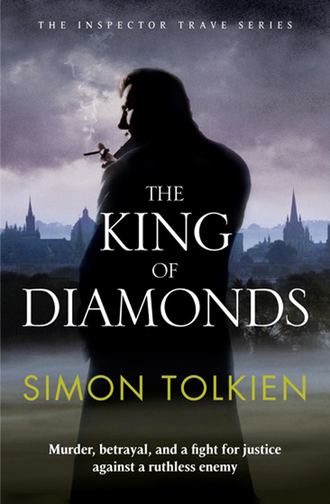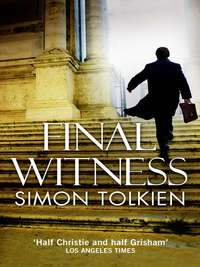
Полная версия
The King of Diamonds
Titus knelt beside his niece on the carpet and gently brushed her long, tousled fair hair back behind her head. Vanessa noticed the tenderness of his touch; she saw the intense worry and concern plainly written all over his face. It was obvious Titus didn’t mean his niece any harm. The idea was ludicrous, thought Vanessa, looking down at the two of them on the floor. Titus was Katya’s protector, not her enemy.
In one fluid movement he picked Katya up in his arms and got to his feet. Vanessa noticed how little effort this seemed to require. Katya was a waif of a person, light as a feather. Titus laid her down softly on the sofa, keeping the cushion under her head to act as a pillow.
‘Shouldn’t we call a doctor?’ asked Vanessa.
‘No, it’s not necessary. She has no fever. Come, you can see,’ said Titus, beckoning Vanessa over and placing her hand on his niece’s forehead. He was right. It felt cool, and she was breathing easily.
‘This has happened before,’ he went on after a moment. ‘It is too little sleep that is the problem. You English have a word for it.’
‘Insomnia?’
‘Yes, insomnia. It is terrible for my Katya. She goes for many hours without sleeping and it makes her crazy. This evening my sister-in-law . . . no, is that right? The sister of my brother-in-law is my sister-in-law? Yes?’
‘Yes, I suppose so,’ said Vanessa, smiling in spite of herself. He often spoke to her like this, like a student of English asking questions of a teacher, and she sometimes felt that that he was half-teasing her, that he knew the answers to his questions before he asked them. Like now for instance. But she didn’t mind. She knew that he was trying to calm her down, and she appreciated his thoughtfulness.
‘Thank you,’ he said with a small bow. ‘So this evening my sister-in-law, Jana, tried to give Katya a sedative to help her sleep, but Katya struggled and became very angry. It is not fair because Jana was only trying to help.’
Vanessa had never met Franz’s sister. Usually she and Titus met in town, and Jana had never come downstairs on the occasions when Vanessa had visited Blackwater Hall. In fact, looking back, Vanessa couldn’t remember Titus ever referring to his sister-in-law before. It had been like she didn’t exist. In other circumstances she would have liked to ask him more about Jana, but now wasn’t the time.
‘And yet it is not Katya’s fault either,’ said Titus, looking down sadly at his niece. ‘She has never recovered from poor Ethan’s death, you know.’
‘Yes, I was remembering that that’s when I last met her. It was here at the dinner party you gave after the trial.’
‘The night when I first met you. A night I will never forget,’ said Titus, bending over and kissing Vanessa’s hand. She smiled again, but went on with her thought.
‘She was so angry. That’s what I remember. Furious with that man, Swain, for what he had done.’
‘Yes, she wanted to kill him. Not that that would have brought Ethan back, of course. Having Swain convicted at the trial was the next best thing. But then, after it was over and Swain had got his sentence, she felt empty. There was nothing more to do and it was time for everyone to get on with their own lives again. But Katya couldn’t. She had no sense of direction – she was like a ship without a rudder. And so she went into Oxford and lost control of herself. This is a beautiful city, but like all cities it has a bad side, an underbelly!’
Titus stopped for a moment, savouring the word, as if pleased that he knew such an obscure piece of English vocabulary.
‘She went to places where a young girl should not go and she did things she should never have done,’ he went on after a moment. ‘She took drugs, Vanessa. Here, look.’ Gently, Titus lifted the sleeve on Katya’s left arm up to the shoulder and pointed to the needle marks dotting the skin above her elbow. ‘And that’s not all. She sold herself.’ Titus’s voice broke, and he put his hand up to his eyes.
‘I’m sorry, Titus. I had no idea. You don’t have to tell me this,’ said Vanessa. She felt appalled, horrified, by what Titus had had to bear.
‘I’m telling you because I want to,’ said Titus, reaching out and taking Vanessa’s hand. ‘Because I don’t want there to be any secrets between us. Because you matter to me, Vanessa. You know that, don’t you?’
Titus looked into Vanessa’s eyes, sensing her response. But then suddenly the connection between them was broken as she looked away over his shoulder with a grimace, and, turning round, he came face-to-face with Franz, standing behind him in the doorway. Like my damned shadow, he thought angrily. Franz was in the way as usual, spoiling everything, just when he had had that instinctive sense that the moment had at last arrived to make a declaration to Vanessa. But then he remembered Katya lying unconscious on the sofa and he felt the injustice of his reaction. Franz was right to interrupt them. The girl couldn’t stay here. She needed to be put to bed. There would be plenty of time for romance later.
‘I’m sorry, Franz. I didn’t see you,’ he said in an even voice. ‘I was just coming to find you to say that Katya was all right. Vanessa here has been kindly looking after her.’
Franz nodded toward Vanessa without saying anything. It was a formal gesture, like a military salute, empty of personal meaning.
‘I’ll take her up,’ he said, crossing over to Katya, but Titus put up his hand in an authoritative gesture before Franz could take hold of her.
‘No, Franz. This is a job for me, I think.’
Franz winced, stepping back as if he’d been struck. Vanessa wondered at his sensitivity but then guessed intuitively that he didn’t like being given orders in front of her.
Again Vanessa was struck by how light Katya seemed to be in Titus’s arms. It wasn’t just sleep the girl needed; it was food and drink. Vanessa knew it wasn’t her place to interfere but she felt she’d have to say something to Titus later when they were alone.
‘I’ll be back in a moment, my dear. Just as soon as I’ve got my Katya tucked up in bed,’ said Titus as he was going out of the door.
‘No problem,’ said Vanessa. ‘I’m fine here.’ But Titus was gone by the time she’d finished her sentence, and she found herself speaking instead to his brother-in-law, who stood facing her with his hand on the door handle.
He looked at her for a moment without speaking and then, bringing his feet together as if standing to attention, he bowed his head but not his back before turning around and leaving the room, pulling the door shut behind him. Vanessa half-expected to hear a key turning in the lock, but nothing happened, and she was left alone in a sudden strange silence.
A phrase she’d read years ago in some forgotten book floated unbidden into Vanessa’s mind: ‘Politeness is one of the most potent weapons in a civilized society.’ Franz Claes didn’t just make her feel uneasy, she realized. She actively disliked him as well.
Vanessa screwed up her eyes and shook her head, doing her best to clear all thoughts of Claes from her head. She preferred to think of Titus. She often found it difficult to summon an image, to accurately visualize a place or a person when they were not there in front of her, but with Titus it was different. He had impressed himself on her mind’s eye from the first, long before they had started seeing each other. Nobody could say that he wasn’t a fine figure of a man. An inch more than six foot from the top of his thick wavy silver hair down to his Italian leather shoes. Generally she had never been attracted to men with beards, but with Titus it was different. The carefully groomed beard and moustache were an extension of his beautiful hair, and she liked the rough texture of it under her fingers.
She didn’t know his exact age but she guessed him to be in his late fifties, and yet he was clearly physically very fit and never seemed tired or deflated. His bright blue eyes, perhaps his most attractive feature, were constantly alert, and sometimes it seemed as if they sparkled, lighting up his face.
He had beautiful taste. His clothes, his house, his possessions – everything was perfect. And yet worn and possessed with an effortlessness that Vanessa had never encountered before. He liked to show her things – between two high bookshelves in his study, for example, a tiny, terrifying painting of the Gorgon’s head by Caravaggio that gazed at her malevolently out of its dark frame, or in the drawing room a silver box embossed with Cyrillic letters and a royal crest in which the last tsar had kept his cufflinks.
‘You know the Bolsheviks told the imperial family to get ready to go out before they shot them. Perhaps this was the last of his possessions that the tsar touched at Ekaterinburg that morning.’
Vanessa remembered how Titus had held the box lightly between his two fingers, holding it up to the afternoon light, as he brought its significance to life with his words. It was the objects themselves, their beauty and their provenance, not his ownership of them, that he seemed to care about. He clearly knew an extraordinary amount about many different things and yet he always seemed interested in Vanessa’s opinion; he was always trying to find out what she really thought. He would press her if he sensed she was just being polite until she had told him her true opinion, and then he would weigh her words, sometimes agreeing, sometimes disagreeing with her point of view.
On a visit to the house two weeks earlier he had elicited a lukewarm response from her to a standard-quality Italianate landscape hanging in the hall, and now on this visit she noticed it had been replaced with a wonderfully vivid, brightly coloured picture of one of the smaller canal bridges in Venice. She knew the place because she’d been there years before with her husband, and the memory had upset her for a moment before she rejected its poignancy with a surge of anger against the man she had left. She remembered the long silences at mealtimes, the empty space between them in their double bed; the way Bill had worked later and later hours down at the police station. He had had no interest in her opinion; he’d made her feel unwanted, useless, a dead weight. Not like Titus, who made her feel so vital – alive in every part of her mind and body.
And Titus was mysterious. She had to admit that was part of the attraction. She liked his foreignness, his elaborate courtesy and the slow deliberation with which he spoke, choosing his words carefully, as if weighing each one of them before use. She realized, of course, that she knew almost nothing more about Titus than what her husband had told her and what she had read about in the newspapers at the time of the Swain trial two years earlier. He was from Antwerp. He had made a fortune dealing in diamonds and had helped Jews escape from Belgium during the war, and then afterwards he had come to England, to Oxford, and become a philanthropist and an art collector, a man of influence and standing, well respected in the town, moving in its highest social circles. So why then would he want her? Vanessa had asked herself this question a thousand times since Titus first started showing interest in her eighteen months earlier, but she had never been able to come up with a satisfactory answer. Perhaps it was the thrill of the chase, the fact that she was so obviously unavailable; perhaps it was the challenge of bringing a smile to the face of someone who was so sad and lost; or perhaps it was just that Titus found her attractive. Perhaps she was beautiful and fascinating just like he said, lost to the world all those years, sitting at home in her North Oxford house, unhappily married to her misanthropic husband.
Vanessa got up from the sofa and went and stood in front of the fireplace, examining herself detachedly in the beautiful oval gold-leaf mirror that hung over the mantelpiece. Yes, she did look different. She could see that now. Better than she’d done in a long time. There was colour in her cheeks, a new lustre in her dark brown hair, and more flesh in her face and on her body, replacing that worn-down boniness that had made her avoid her reflection for so long. The truth was that she’d begun to look after herself since leaving her husband the previous year. She’d discovered she was a good cook. Bill had always seemed to want solid British fare, but now she was free to experiment. She enjoyed shopping in the Covered Market off the High Street, buying herbs and spices with exotic names and trying out recipes that she would never have dreamt of attempting back home in North Oxford. Sometimes her concoctions ended in disaster, but it didn’t matter if there was no one there to criticize. It was all a learning experience, and by the time that Titus started coming to dinner, she found that she knew what she was doing, and it was obvious that the compliments he paid her on her cooking were genuine. Such a contrast to her husband, who had never said anything about the food she put in front of him; he was too self-absorbed to care about what he put in his mouth or what his surroundings looked like.
And she’d also begun to paint again for the first time in as long as she could remember, taking advantage of the long summer evenings after work to ride her bicycle out onto Port Meadow with a folded-up easel across her back and her watercolours and paper in a canvas bag hanging from the handlebars. She’d been quite good once, or so her tutor at the art school that she’d attended for a year after college had told her, and she’d enjoyed the paintings and sketches she’d made on the sunlit holidays in France and Italy that she’d taken with Bill in the years after they were first married. In fact she didn’t really know why she had stopped. Lack of encouragement perhaps. Whatever the explanation, it was certainly Titus’s encouragement that had got her started again. She had hung one or two of her old pictures on the walls of the little flat that she’d rented behind Keble College, and he’d stood admiring them on his first visit, wanting to know the name of the artist. And then when he found out it was her, he’d insisted on taking her to an art supplies shop he knew down a tiny side street off George Street and buying her the materials to start again.
‘It’s a crime,’ he’d told her in a voice that brooked no argument, ‘to waste such God-given talent.’
And since then she hadn’t looked back. The painting made her happy, and when she painted, she thought of Titus.
Vanessa’s paintings now covered the walls of her flat, lighting it up with colour and life. It was a small place, just enough for her needs, but she’d grown to like it more and more as the months passed. She’d deliberately rented the flat unfurnished and then bought the furniture herself piece by piece. She didn’t have much money. The temporary job that she’d taken on as a secretary and personal assistant to an overworked professor in the university’s English faculty didn’t pay well, but she had come to relish the challenge of shopping on a shoestring, finding treasures in secondhand stores that she’d never previously heard of, down narrow side streets in parts of Oxford that she’d never visited before. She’d made her own home and she was proud of it. The flat, of course, was a million miles away from the grandeur of Blackwater Hall, but Titus genuinely seemed to like it there when he came to visit.
He had a way of making her seem special, and in his company she had begun to come alive again. It had been more than three years now since Joe died and she still felt the pain. It was there all the time but it was dulled. After it happened she’d spent more than a year feeling that the world was entirely without point, dragging herself through every day in a grey blur. She’d contemplated suicide more than once, even weighed up the pros and cons of the different possible methods of putting an end to her pain, but she saw now that she had never been truly serious. The will to live was too strong inside her. It had flickered for a while like a guttering candle, but it wasn’t going to be extinguished. And her anger against her husband’s silence, his refusal to try to move forward, was in a way the first sign of her recovery. Titus had arrived at just the moment when her desire for life had first begun to outweigh her guilt at living. And now she was halfway to falling in love.
CHAPTER 3
‘You can’t let them get to you, Davy. That’s the point. Whether it’s that bitch who put you in here, whether it’s the screws, or whether it’s the other cons, you’ve got to remember it’s your life, not theirs. And you’ve got to keep it that way.’
Just as he had done every night for the previous two weeks, David Swain lay on his back in the dark listening to the voice of Eddie Earle coming down to him from the bunk above his head, and, as always, he felt that same odd mixture of irritation and gratitude. Irritation because Eddie kept calling him Davy – a nickname that nobody else had ever used and that David really didn’t like – and because Eddie never seemed to stop telling him how to live his life. Gratitude because he gave David a sense of security that he’d been missing ever since he’d first arrived in prison following his arrest more than two years earlier.
It had got worse after his conviction – much worse. The judge had thrown away the key, had called him a coward, a knife-in-the-back murderer, and sent him down for life. And overnight David had become a number, an object to be moved around without explanation from cell to cell, from wing to wing, from gaol to gaol, until he’d ended up back where he’d started – in Oxford Prison. Days, months, years of terrible food and waiting in cold corridors, of boredom and claustrophobia banged up in tiny airless cells, had brought David full circle.
It didn’t surprise him that he’d ended up back in Oxford. Nothing much surprised him any more. Prison was cruel, and here, locked away in the centre of his own hometown, it was just a bit more painful than anywhere else. That’s all. A few hundred yards away on the other side of a thirty-foot brick wall surmounted with barbed wire, the world he’d left behind was going on without him, impervious to his absence. In the mornings he could hear the bells ringing in Magdalen Tower and in the afternoons he could see the tallest spires of the city’s churches from the prison exercise yard. So near and yet so far; the proximity of the world outside was an exquisite torture.
And he was very different now from the man he’d been when he’d begun his sentence, less and less able to cope with the despair that was eating him up from the inside. Physically, he had survived. There had been pushes, punches, even a few kicks along the way, but he had got through them. And it could have been worse. David knew all about the mindless violence that was always waiting as a possibility around the next corner – God knows he’d seen it often enough, but so far he had avoided the worst by keeping his head down, not answering back, not getting involved.
Spiritually and emotionally, however, it was a very different story. Over time he had learnt to accept the arbitrariness of prison life: the endless petty rules that existed only to be broken, the lack of choice. And he had tried to get used to the strange combination of noise and isolation, his twin companions through the endless long days and sleep-interrupted nights. But underneath he had lost hope and purpose. His personality, already fragile and damaged at the time of his arrest, had disintegrated under the stress of prison life, and the anger and despair that raged inside him were now only kept in check by fear. He longed for someone to cling to as he sank, for someone to hold him up, and then, entirely unexpectedly one day, a friend appeared. He was called Eddie Earle.
With a smile David remembered the day that his new cellmate had arrived. He’d been alone for over a week, ever since O’Brien, the previous occupant of the top bunk, had been transferred to the punishment block in D Wing for attacking another prisoner with a pool cue in the rec room. O’Brien had not been a bad cellmate. Tall, taciturn, and religious, with a permanent furrow etched across his massive brow, he’d actually gone so far as to give David a book called JESUS FOR PRISONERS. David hadn’t yet read more than the first paragraph but he appreciated the thought. Gifts weren’t a daily occurrence in HM Prison Oxford.
O’Brien’s problem was his temper. It was what had got him put away in the first place. And he had an enemy on B Wing who’d been goading him for weeks. Something about taking too much food in the canteen, something stupid, but still O’Brien shouldn’t have reacted. He only had himself to blame. And his departure had meant that David had had to start worrying again about who would be coming in next to share his ten-by-ten cell and stinking chamber pot. Not some crazy, he prayed after lights-out to a God he had no faith in whatsoever. Not some fucking crazy psychopath. But he needn’t have worried. Eddie Earle, Easy Eddie as he liked to be known among his friends, was nothing like that at all.
Eddie had self-respect. If David had had to name one quality that singled out his new cellmate, that would’ve been the one he picked. He refused to be a number; he refused to give in to the system. David thought at first that this would lead to endless problems with the screws, problems that he could do without. But that wasn’t how it worked out. Eddie had an easy way with him – it must have been how he’d got his nickname, and the screws laughed at his jokes and didn’t seem to pick on him like they did with the other prisoners. Almost immediately this started to bring benefits for David because Eddie seemed to be able to get hold of anything he put his mind to. Soft toilet tissue, fresh fruit, magazines, and even on one memorable occasion two cans of beer appeared like magic in the cell. The screws turned a blind eye, and Eddie shared everything he got with David. ‘Because that’s what cellmates do,’ he said.
‘You’ve got to take care of yourself. That’s the secret,’ Eddie announced on that memorable afternoon when they’d sat on David’s bunk and raised their cans of Special Brew in a toast to the poster of Elizabeth Taylor in a sultry, low-cut dress that Eddie had put up on the opposite wall.
‘Liz has to, you know,’ he went on musingly. ‘Imagine the time she spends every evening with her paint bottles and stuff getting ready to go out to one of them Hollywood parties. Monty Clift’s outside, walking up and down getting all sweaty and impatient, but, oh no, she’s got to get it right. Eyebrows, makeup, lipstick. Not a fucking hair out of place. And you know why, Davy? You know why?’
It was a rhetorical question and David sat sipping his beer, halfway to heaven with the taste of it, waiting for the answer.
‘Because she cares about herself. That’s why.’
‘Not that easy in here though, is it?’ said David, sounding a note of realism. It was a long way from HM Prison Oxford to Beverly Hills, California.
‘No, it ain’t,’ said Eddie, agreeing. ‘But I’ll tell you this much – looking after yourself when you’re inside is where it’s most important. Because in here is where they’re trying to take your pride away every minute of the day. I should know – I’ve been in prison enough times. The point is, Davy, it doesn’t matter where you are – Hollywood or Her Majesty’s pleasure. You’ve got to keep your head up. That’s what I do. And it’s what you’ll do if you’ve got any sense. Why do you think I’m working out down in the gym during association? Why do I try and eat proper food?’ said Eddie, jabbing his finger over at the two rows of apples and pears carefully arranged on the rickety shelves under Elizabeth Taylor’s poster.
‘I’ve noticed you spending a lot of time looking in the mirror, Eddie. I suppose that’s the same thing,’ said David, trying to inject a lighter note into the conversation. He didn’t really disagree with Eddie’s take on how to survive prison life but it was instinctive for him to rebel a little whenever he found himself being lectured about anything. And Eddie was indeed almost obsessive about his personal appearance. He spent ages every morning stooped in front of the broken piece of glass screwed to the wall at the back of the cell, combing his jet-black hair until the parting was razor straight, and he insisted on the barber who came round to shave the prisoners every morning taking extra care with the long sideburns that he’d grown in the style of Elvis Presley. David had learnt very early in their relationship that the two great loves of Eddie’s life were America and show business.







